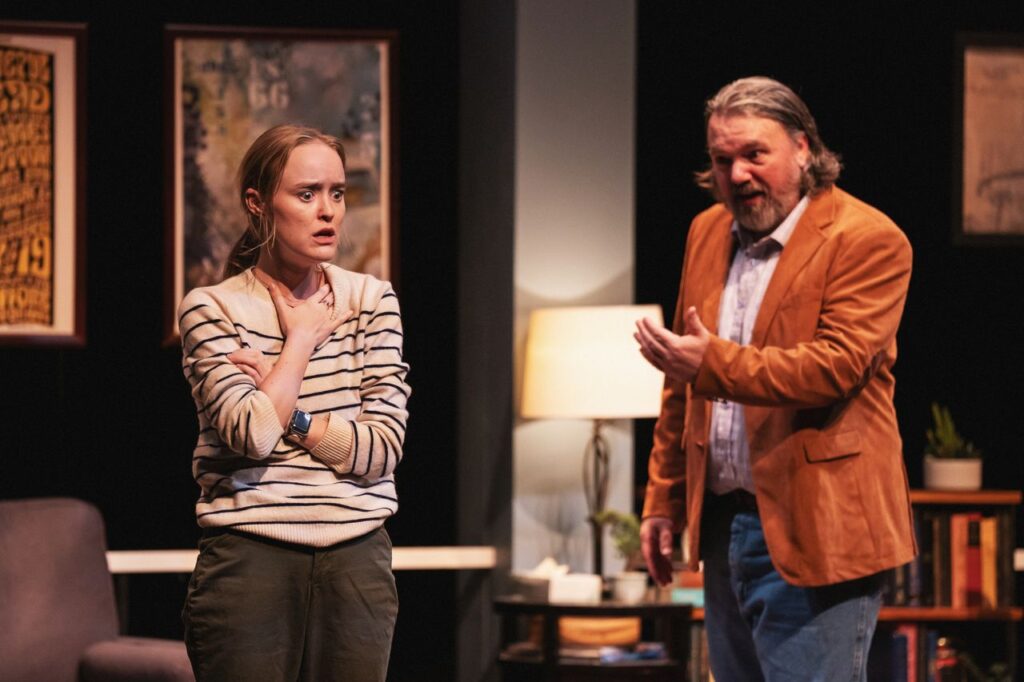Review: JOB
Posted by Curtain Up! on Nov 18, 2025
Review: JOB | Curious Theatre Company | Curious Theatre Company, Denver, CO | Curtain Up! | Eric Fitzgerald | November 18, 2025

Photo: Amanda Tipton Photography | Tuuli Sandoval as Jane and Michael Morgan as Loyd
As tech companies grapple with the human toll of content moderation, Curious Theatre Company presents a chillingly relevant drama. Continuing its mission to showcase provocative, socially meaningful work, Curious Theatre Company presents JOB, a psychological drama by Max Wolf Friedlich, directed by Josh Hartwell.
Set in the Bay Area on the eve of the COVID-19 pandemic, JOB follows a young content moderator whose mandated therapy session escalates into a tense confrontation with her therapist, raising questions about trauma, truth, and institutional accountability. The production reflects Curious’s ongoing commitment to producing theatre “that reflects the full spectrum of human experience,” as described by producing artistic director Jada Suzanne Dixon, and offers a timely look at mental health in the digital age.
In JOB, Max Wolf Friedlich crafts a tense, two-character psychological drama set in a therapist’s office on the eve of the COVID-19 pandemic. Jane (Tuuli Sandvold), a young content moderator for a major tech company, has been placed on leave after a public breakdown. She’s been sent to Loyd (Michael Morgan), a seasoned therapist, for a mandatory evaluation to determine whether she’s fit to return to work.
What starts as a clinical assessment quickly becomes a tense, layered confrontation. Jane recounts the emotional toll of filtering violent online content, while Loyd offers guarded empathy and shares personal losses of his own. As their session deepens, Jane begins to suspect Loyd is not who he claims to be—leading to a chilling accusation and a final twist that leaves the audience questioning everything they’ve seen.
The title JOB carries unmistakable religious significance, evoking the biblical figure who endures great suffering while questioning justice, faith, and meaning. In the play, this significance deepens the emotional stakes: Jane, like her namesake, faces relentless psychological torment—not from a divine force, but from the unseen machinery of a tech company and the trauma it causes. Her confrontation with Loyd becomes a contemporary trial of belief, not in God, but in systems, memory, and the potential for truth. The play’s ambiguity reflects the Book of Job’s refusal to provide simple answers, instead encouraging audiences to sit with uncertainty and bear witness.
Tuuli Sandvold delivers a powerful, controlled performance as Jane, anchoring JOB with a quiet intensity that gradually builds throughout the play. Her portrayal captures the emotional complexity of a character caught between trauma and clarity, balancing restraint with moments of raw vulnerability. Sandvold’s mastery of pacing and tone allows the tension to simmer beneath each line, making Jane’s unraveling feel both inevitable and deeply human. In a role that demands precision and emotional depth, Sandvold delivers a performance as unsettling as it is empathetic—never tipping into hysteria but always suggesting the storm beneath.
Michael Morgan delivers a grounded and capable performance as Loyd, the therapist whose calm demeanor anchors the play’s rising tension. His portrayal brings steady professionalism, helping the audience focus on Jane’s unraveling and the ethical questions at the heart of their exchange. While the character’s emotional depth remains somewhat understated, Morgan’s restraint adds clinical realism to the session, supporting the production’s psychological framework. His presence provides a clear contrast to Jane’s volatility, even as the play hints at darker complexities beneath the surface.
Josh Hartwell’s direction of JOB is sharp, laser-focused, and precisely controlled. Hartwell maintains a firm hold on pacing and tone, allowing the tension between Jane and Loyd to develop naturally without ever becoming overwhelming. The staging is simple yet impactful, emphasizing emotional stakes over visual distractions. Hartwell’s choices demonstrate a solid understanding of the play’s psychological structure, guiding the audience through its ambiguity with restraint and clarity. While the production isn’t overdone, it resonates with quiet, powerful confidence — a confident hand guiding a volatile script.
The physical production of JOB is deliberate and highly effective, with each design element enhancing the play’s psychological depth. Scenic designer Brian Watson crafts a space that is both clinical and claustrophobic, resembling a therapist’s office, rendered with such stark precision that it becomes a character in its own right. His design amplifies the feeling of confinement and observation, allowing the tension between Jane and Loyd to simmer in every corner. Madison Booth’s costumes subtly reflect the characters’ emotional states, while Jon Olson’s lighting accentuates the play’s tonal shifts with surgical accuracy. The play features extreme lighting effects that heighten the action. Max Silverman’s original music and sound design create an undercurrent of unease, and Annette Westerby’s carefully chosen props ground the action in tactile realism. Together, the team makes a world that feels both ordinary and ominous—ideally suited for the play’s slow-burning suspense.
At just eighty minutes, JOB delivers a tightly crafted theatrical experience that resonates long after the final blackout. Under Josh Hartwell’s focused and confident direction, Max Wolf Friedlich’s script unfolds with clarity and urgency, immersing the audience in a psychological crucible where truth and perception clash. Anchored by a strong cast, the production maintains a firm grip on tension while leaving room for ambiguity and emotional depth. It’s a lean, unsettling piece of theatre that reflects Curious Theatre Company’s dedication to bold, thought-provoking storytelling.
For information and tickets: https://www.curioustheatre.org/event/job/
